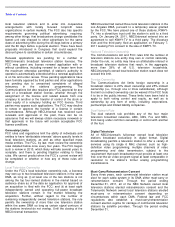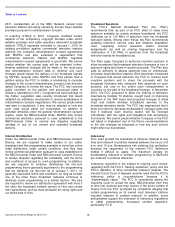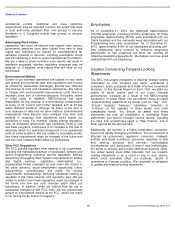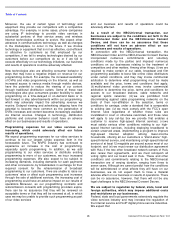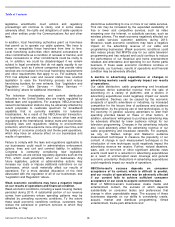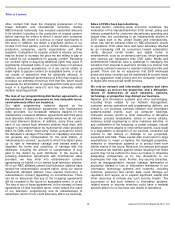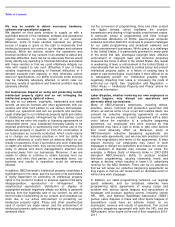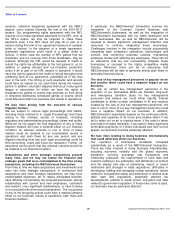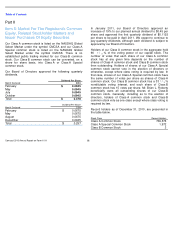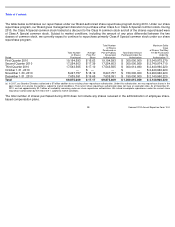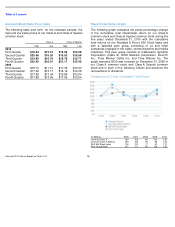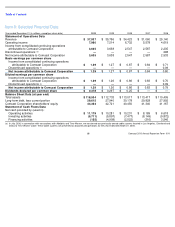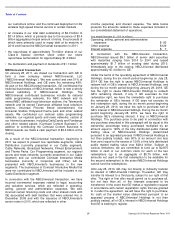Comcast 2010 Annual Report Download - page 33
Download and view the complete annual report
Please find page 33 of the 2010 Comcast annual report below. You can navigate through the pages in the report by either clicking on the pages listed below, or by using the keyword search tool below to find specific information within the annual report.
Table of Contents
We may be unable to obtain necessary hardware,
software and operational support.
We depend on third party vendors to supply us with a
significant amount of the hardware, software and operational
support necessary to provide certain of our services.
Moreover, some of these vendors represent our primary
source of supply or grant us the right to incorporate their
intellectual property into some of our hardware and software
products. While we actively monitor the operations and
financial condition of key vendors in an attempt to detect any
potential difficulties, there can be no assurance that we would
timely identify any operating or financial difficulties associated
with these vendors or that we could effectively mitigate our
risks with respect to any such difficulties. If any of these
vendors experience operating or financial difficulties or if
demand exceeds their capacity or they otherwise cannot
meet our specifications, our ability to provide some services
may be materially adversely affected, in which case our
business, results of operations and financial condition may be
adversely affected.
Our businesses depend on using and protecting certain
intellectual property rights and on not infringing the
intellectual property rights of others.
We rely on our patents, copyrights, trademarks and trade
secrets, as well as licenses and other agreements with our
vendors and other third parties, to use various technologies,
conduct our operations and sell our products and services.
Legal challenges to our intellectual property rights and claims
of intellectual property infringement by third parties could
require that we enter into royalty or licensing agreements on
unfavorable terms, incur substantial monetary liability or be
enjoined preliminarily or permanently from further use of the
intellectual property in question or from the continuation of
our businesses as currently conducted, which could require
us to change our business practices or limit our ability to
compete effectively or could have an adverse effect on our
results of operations. Even if we believe any such challenges
or claims are without merit, they can be time-consuming and
costly to defend and divert management’s attention and
resources away from our businesses. Moreover, if we are
unable to obtain or continue to obtain licenses from our
vendors and other third parties on reasonable terms, our
business and results of operations could be adversely
affected.
In addition, NBCUniversal’s intellectual property constitutes a
significant part of its value, and the success of its businesses
is highly dependent on protecting its intellectual property
rights in the content it creates or acquires against third-party
misappropriation, reproduction or infringement. The
unauthorized reproduction, distribution or display of
copyrighted material negatively affects our ability to generate
revenue from the legitimate sale of our content, as well as
from the sale of advertising on our content, and increases our
costs due to our active enforcement of protecting our
intellectual property rights. Piracy and other unauthorized
uses of content are made easier, and the enforcement of
intellectual property rights more challenging, by technological
advances allow-
ing the conversion of programming, films and other content
into digital formats, which facilitates the creation,
transmission and sharing of high-quality unauthorized copies.
In particular, piracy of programming and films through
unauthorized distribution on DVDs, peer-to-peer computer
networks and other platforms continues to present challenges
for our cable programming and broadcast networks and
filmed entertainment businesses. While piracy is a challenge
in the United States, it is particularly prevalent in many parts
of the world that lack developed copyright laws, effective
enforcement of copyright laws and technical protective
measures like those in effect in the United States. Any repeal
or weakening of laws or enforcement in the United States or
internationally that are intended to combat piracy and protect
intellectual property rights, or a failure of existing laws to
adapt to new technologies, could make it more difficult for us
to adequately protect our intellectual property rights,
negatively impacting their value or increasing the costs of
enforcing our rights. See “Legislation and Regulation —
Other Areas — Intellectual Property and Piracy” above for
additional information.
Labor disputes, whether involving our own employees or
sports leagues, may disrupt our operations and
adversely affect our business.
Many of NBCUniversal’s employees, including writers,
directors, actors, technical and production personnel and
others, as well as some of our on-air and creative talent, are
covered by collective bargaining agreements or works
councils. If we are unable to reach agreement with a labor
union before the expiration of a collective bargaining
agreement, our employees who were covered by that
agreement may have a right to strike or take other actions
that could adversely affect us. Moreover, many of
NBCUniversal’s collective bargaining agreements are
industry-wide agreements, and we may lack practical control
over the negotiations and terms of the agreements. A labor
dispute involving our employees may result in work
stoppages or disrupt our operations and reduce our revenue,
and resolution of disputes may increase our costs. For
example, a Writers Guild of America strike in 2007-2008
disrupted NBCUniversal’s ability to produce scripted
television programming, causing viewership levels and
ratings to decline, which resulted in lower U.S. advertising
revenue for the NBC Network. There can be no assurance
that we will renew our collective bargaining agreements as
they expire or that we can renew them on favorable terms or
without any work stoppages.
In addition, our cable programming networks, our regional
sports networks, and our broadcast networks have
programming rights agreements of varying scope and
duration with various sports leagues and associations to
broadcast and produce sporting events, including certain
NFL, NHL and National Basketball Association (“NBA”)
games. Labor disputes in these and other sports leagues or
associations could have an adverse impact on our
businesses, revenue and results of operations. The current
collective bargaining agreement with both the NFL and the
NBA players’ union expire at the end of their respective 2010-
2011


